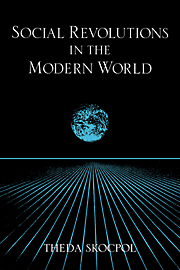Book contents
- Frontmatter
- Contents
- Acknowledgments
- INTRODUCTION
- I DOING MACROSCOPIC SOCIAL SCIENCE
- II MAKING SENSE OF THE GREAT REVOLUTIONS
- III A DIALOGUE ABOUT CULTURE AND IDEOLOGY IN REVOLUTIONS
- IV FROM CLASSICAL TO CONTEMPORARY SOCIAL REVOLUTIONS
- 9 What makes peasants revolutionary?
- 10 Rentier state and Shi'a Islam in the Iranian Revolution
- 11 Explaining revolutions in the contemporary Third World
- 12 Social revolutions and mass military mobilization
- CONCLUSION
- Index
11 - Explaining revolutions in the contemporary Third World
Published online by Cambridge University Press: 05 June 2012
- Frontmatter
- Contents
- Acknowledgments
- INTRODUCTION
- I DOING MACROSCOPIC SOCIAL SCIENCE
- II MAKING SENSE OF THE GREAT REVOLUTIONS
- III A DIALOGUE ABOUT CULTURE AND IDEOLOGY IN REVOLUTIONS
- IV FROM CLASSICAL TO CONTEMPORARY SOCIAL REVOLUTIONS
- 9 What makes peasants revolutionary?
- 10 Rentier state and Shi'a Islam in the Iranian Revolution
- 11 Explaining revolutions in the contemporary Third World
- 12 Social revolutions and mass military mobilization
- CONCLUSION
- Index
Summary
Frontiers of research move with history, although often with a lag. Two decades ago, most comparative research on revolutions remained focused on the classical great revolutions of the West: those of England, France, and Russia. Occasionally, a bold scholar included non-European revolutions (particularly the Chinese and Mexican) in broader comparative studies. It was not until the mid-1970s, however, that comparative scholars began to focus on the features distinctive to Third World social revolutions – the social and political upheavals in smaller, dependent states outside of Europe. At first, perhaps, scholars supposed that such social revolutions would happen only occasionally during decolonization such as those that played themselves out after World War II. Yet modern world history has continued to be punctuated by social revolutions, not only in postcolonial Southeast Asia, Algeria, and Portuguese Africa, but also in formally independent states such as Cuba, Ethiopia, Iran, and Nicaragua. As new social revolutions have continued to occur, scholars have been challenged to broaden their scope of comparative studies beyond the classical revolutions of Europe, and they have entertained models of causation applicable across many smaller non-Western nations in the twentieth-century world context.
In this article, we point to what we consider the most promising avenues for comparative analyses of contemporary Third World revolutions. In particular, we shall offer some working hypotheses about the distinctively political conditions that have encouraged revolutionary movements and transfers of power in some, but not all, Third World countries.
- Type
- Chapter
- Information
- Social Revolutions in the Modern World , pp. 259 - 278Publisher: Cambridge University PressPrint publication year: 1994
- 6
- Cited by



